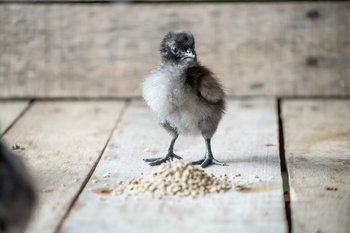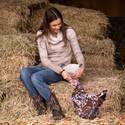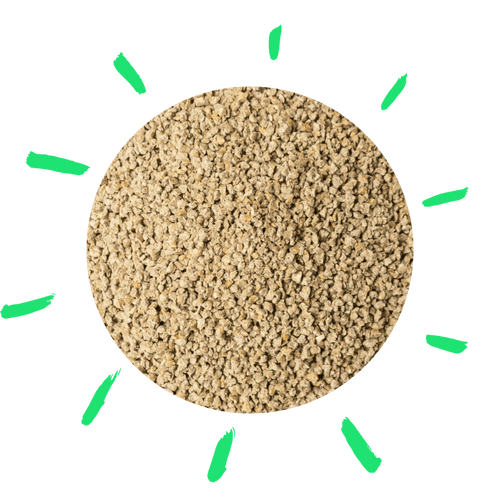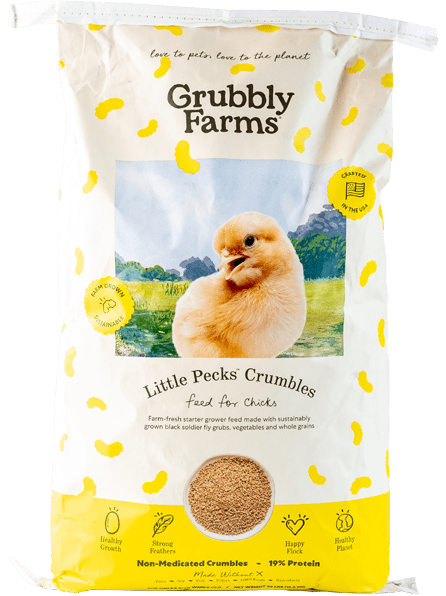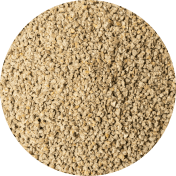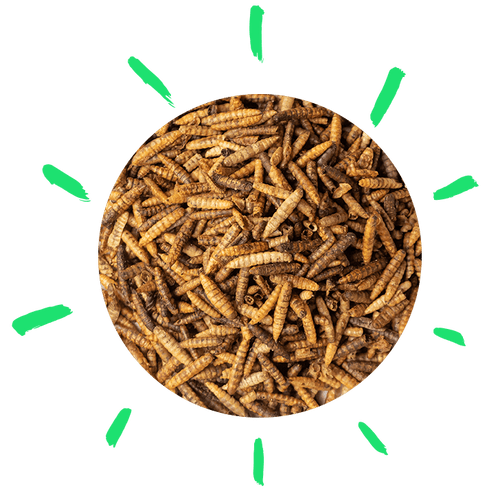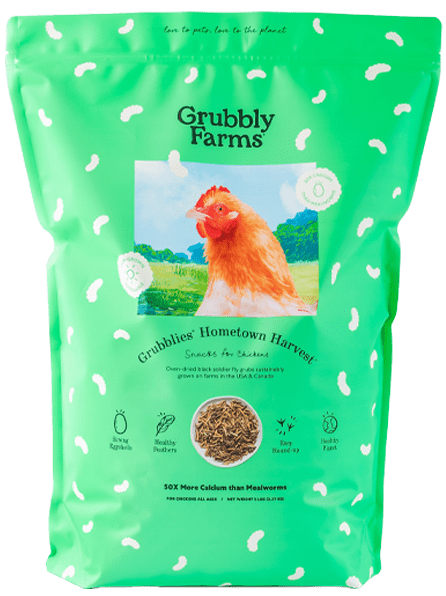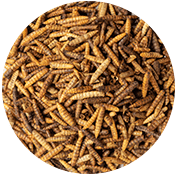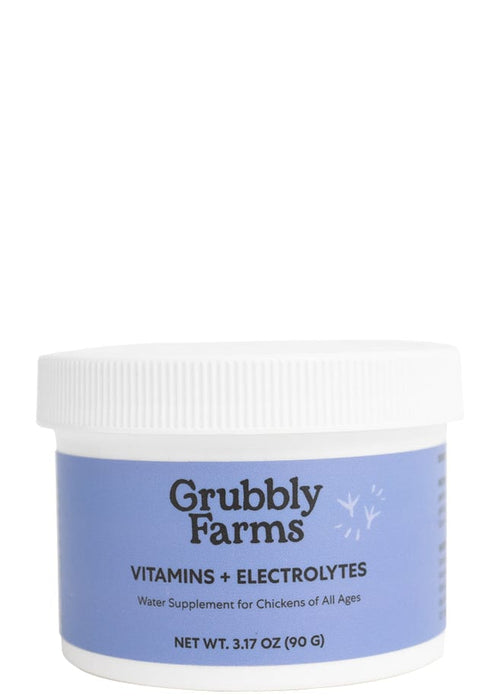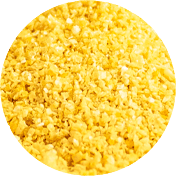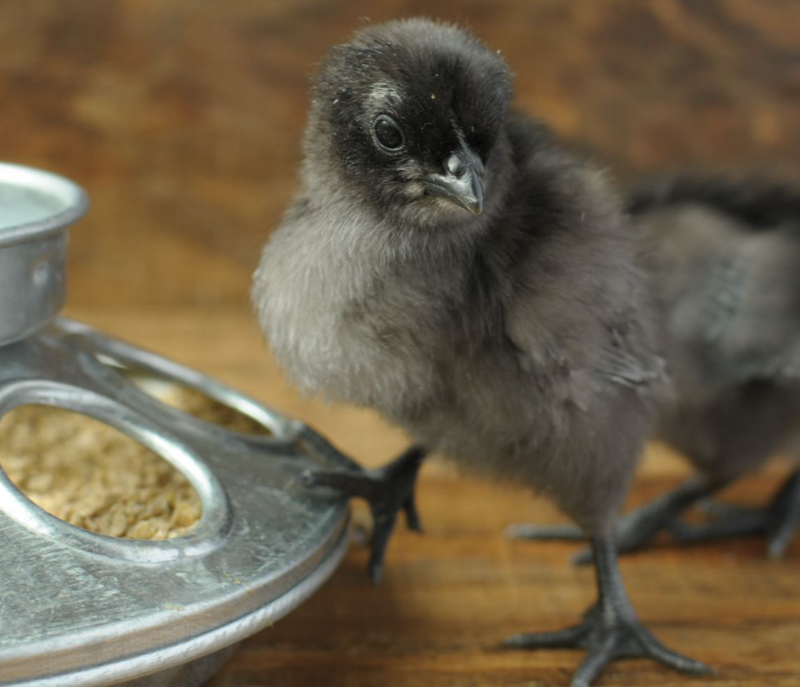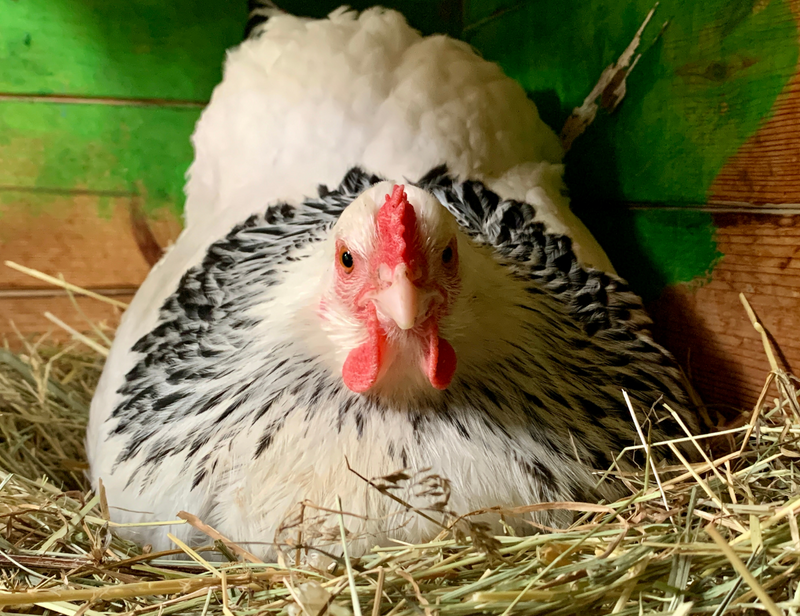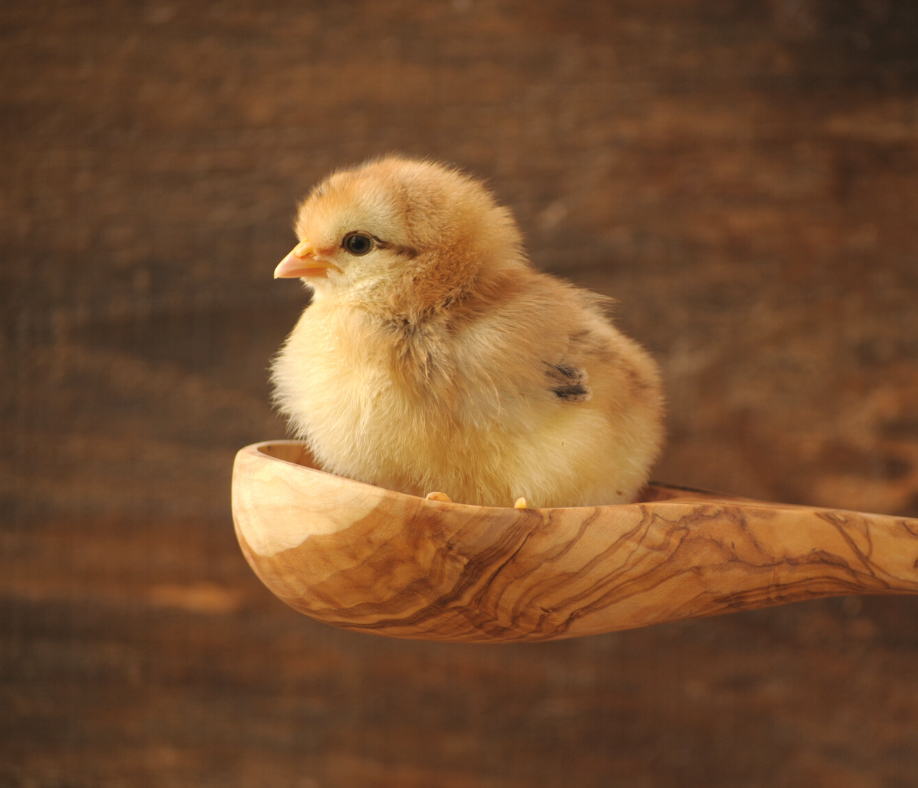Baby chicks need a daily diet of chick starter grower feed in order to grow healthy and strong! However, when it comes to choosing the right chick starter grower feed for your chicks, you may have noticed that chick feed comes in two varieties: medicated feed and non-medicated feed. Understanding the difference between medicated chick starter feed and non-medicated chick starter feed can help you decide on which feed is best for your brood!
What is Medicated Chick Feed?
Medicated chick starter feed is chick feed that is formulated with a medication called amprolium. This medicine can help baby chicks build their immunity to one of the most common diseases to affect chicks, coccidiosis.
How Does Amprolium Help Chicks Fight Coccidiosis?
The coccidia parasite relies on thiamine (or Vitamin B) to multiply. Amprolium blocks the absorption of thiamine, preventing coccidia parasites from proliferating. Medicated chick feed contains a small amount of amprolium, which is just enough to inhibit the parasites from over-burdening the chick’s system.
Although it may sound counterintuitive, allowing some of the coccidia to live, gives the chick’s immune system practice fighting off the parasite.
Will Medicated Chick Feed Stop a Coccidiosis Outbreak?
No. Medicated chick feed will not treat an outbreak of coccidiosis because there is not enough Amprolium in the feed to kill the parasite. Amprolium is a “coccidiostatic,” which renders the cocci sterile versus a “coccidiocidal,” which kills the parasite.
A Closer Look at Coccidia & Coccidiosis
Coccidia is an extremely common parasite. They live in both land and water. For many animals, the parasite has little to no effect. Some species of cocci are harmless, while others can cause severe health issues and even death. But for chickens, the parasite can wreak havoc if unchecked, even becoming fatal for some chicks and chickens.
Why Is Coccidiosis So Dangerous for Chicks?
Coccidiosis is often most harmful to chicks because they haven’t developed the antibodies to fight the parasite yet. Not only are chicks more susceptible because they don’t have the antibodies to fight cocci, but they are also raised in an environment conducive to cocci thriving. The warm environment of the brooder is ideal for the cocci parasite to proliferate if it is not controlled.
The worst cases of coccidiosis typically pop up when the chicks are 4 to 5 weeks of age, once the parasite has established itself in the chick’s gut. Additionally, this is the time when most chicks are moved outdoors. This outdoor setting can harbor the parasite.
The Great Outdoors: A Great Environment for Coccidia
While it may be tempting to avoid exposing your chicks to cocci altogether, that is impossible. As soon as your young birds experience the great outdoors, they are exposed to the various cocci parasites present in their environment. So, in order to make sure chicks aren’t affected by coccidiosis, they must build up immunity to the parasite from a young age. You can do this by helping them build a natural immunity to the parasite or through medicated feed.
Should I Feed my Chicks Medicated Feed?

If medicated chick feed helps prevent coccidiosis, then shouldn’t I be feeding medicated chick feed to my chicks? There really is no right or wrong answer. When deciding whether or not to choose medicated chick feed for your brood, you will want to consider the pros and cons of medicated feed in relation to your flock’s situation.
Pros of Medicated Starter Chick Feed
Medicated feed can be used as a prevention for chicks who have not been vaccinated for cocci by a breeder or hatchery.
Feeding medicated chick feed to your brood does not require a prescription from a vet.
Cons of Medicated Starter Chick Feed
First, medicated chick feed does not kill cocci or stop an infection once it's started. It can only be used as a preventative measure.
Lastly, your chicks must be exposed to cocci in order for the medicated feed to be effective. The Amprolium can only inhibit the parasite if the parasite is present, and chicks can only build immunity if they are exposed to cocci.
Some new chick owners aren’t aware that medicated feed is not 100% effective. Chicks can still become ill with coccidiosis, and many of their owners don’t realize the issue until it’s too late.
Amprolium is also only effective against coccidiosis and no other parasite.
When to Avoid Medicated Chick Feed
There are a few instances when you should definitely NOT feed your chicks medicated chick feed.
If your chicks have already been vaccinated for coccidiosis, then you should not feed them medicated chick feed.
Medicated chick starter feed can lead to a thiamine deficiency (see below for more information).
Also, medicated chick feed should not be fed to waterfowl, such as ducks. Waterfowl consume more feed on a daily basis than chicks do, so they could potentially overdose on the Amprolium contained in the medicated chick feed. Medicated chick feed has been specifically formulated with a dosage that is calculated on a chick’s daily feed consumption.
Medicated Feed & Thiamine Deficiencies
Medicated chick feed can have one side effect on your brood: a thiamine deficiency. Since Amprolium is a thiamine blocker, it only makes sense that a thiamine deficiency could result from feeding medicated chick starter.
However, you don’t want to supplement with thiamine while you are feeding medicated chick feed. The Amprolium would block absorption of the thiamine, anyway.
Instead, feed medicated chick feed during the high-risk stage of your brood’s life (about 1 to 5 weeks of age). Then switch to a non-medicated chick feed and start giving your brood a thiamine or vitamin supplement to combat the thiamine deficiency.
When to Choose Non-Medicated Chick Feed
Many chick owners opt for a more natural approach to raising their flock. This often includes skipping medicated chick feed. While many larger-scale breeders lean into medicated feed due to a high number of chickens, many backyard flocks owners choose non-medicated feed with a natural immunity approach. This approach often works well and can prevent the risk of thiamine issues.
How to Encourage Chicks to Build Natural Immunity to Coccidia

Chicks can be raised without medicated chick feed just as well through gradual exposure to their surroundings. Coccidiosis can be effectively managed or prevented without using medicated chick starter feed.
If chicks are raised properly in a clean, dry environment, the chicks will be able to naturally build up immunity to the parasite through gradual exposure.
Like Mother Hen, Like Chicks
When chicks are raised by a mother hen, the chicks are inclined to sample some of the mother hen’s poop. This less-than-savory instinct actually helps the chicks build up immunity to the cocci parasite present in the mother hen’s poop (cocci that she already has immunity to).
Spring & Early Summer Coop Introductions
Raising chicks in the spring and early summer also presents a lower risk for cocci. The parasite is not as prolific in the cooler temperatures often associated with the spring months. This allows the chicks to become exposed to the parasite in small quantities through their environment.
Keeping a Clean Brooder
Regularly cleaning the brooder can also help keep coccidiosis from proliferating in the brooder environment. Daily droppings management and weekly thorough cleaning of the brooder can be effective in preventing coccidiosis. Removing all the litter from the brooder once a week and replacing it with fresh litter is a good brooder cleaning practice.
Make sure the brooder never has extremely wet litter in it and that it is properly sanitized after each batch of chicks. The brooder should have good ventilation (but no drafts) to allow for good air exchange within the brooder.
Food & Water Management
Keeping your brood’s food and water clean (poop-free) also goes a long way in preventing coccidiosis.
Maintain Proper Brooder Space
There should be plenty of space for the chicks, even as they grow, to prevent overcrowding in the brooder.
Field Trips
Short trips outside on nice days can help create controlled exposure, as can introducing clean clumps of grass or weeds to your chicks while they are in the brooder. Gradually increase the time your chicks have exposure to the outdoors as they grow.
Natural Supplements
Natural supplements can also be added to your brood’s diet to help prevent or fight the cocci parasite. Crushed garlic and various culinary herbs can be offered free choice or added to your brood’s water.
Garlic is naturally antiparasitic and many herbs have immune-boosting properties. Adding probiotics to your brood’s feed or water can also help boost good gut flora for fighting off parasites.
Avoid High-Risk Factors for Coccidiosis in Chicks
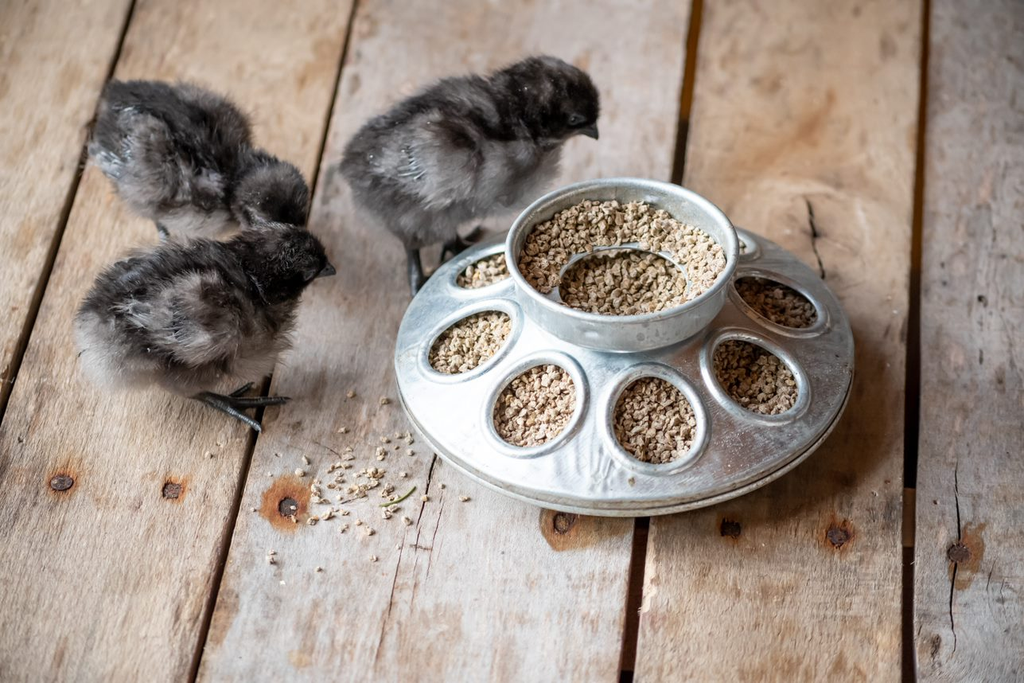
There are times when your brood may be at a higher risk of exposure to coccidiosis. Here are some factors that could cause a high risk for your brood to become infected by coccidiosis:
- Warm & Humid Climates: The cocci parasite thrives best in warm, humid weather
- Overcrowding: Too many chicks in too small of an area can lead to a higher concentration of the cocci parasite in the environment
- Improper Cleaning: If chicks are kept in the same brooder for longer than 3 weeks without proper cleaning procedures, the cocci parasite can become prolific
In these situations, you may consider using medicated chick feed to jump-start the antibody-building process to fight coccidiosis.
Provide Your Future Flock the Best Start
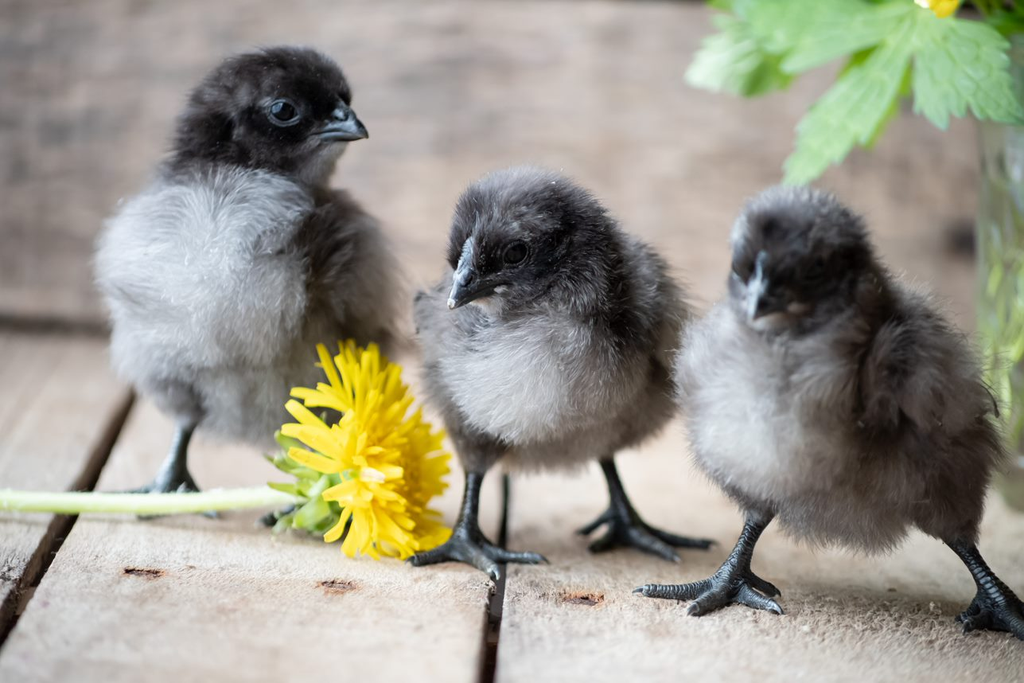
Whether you choose to start your brood off on a non-medicated starter grower feed with a natural immunity approach or opt for medicated feed, providing your chicks with the best conditions increases their quality of life. Grubbly Farms offers a natural starter grower feed, filled with non-medicated ingredients that they would naturally forage for in the wild. With a natural immunity approach, you can ensure your chicks and ducklings are less apt to experience a thiamine deficiency. However, no matter your approach to your chicks’ coccidiosis protection, be sure you know the signs of a coccidiosis outbreak and be prepared to contact your vet if needed.
Providing a diet filled with the nutrients helps ensure your brood will be as strong, healthy, and ready to take on the day, every day.





